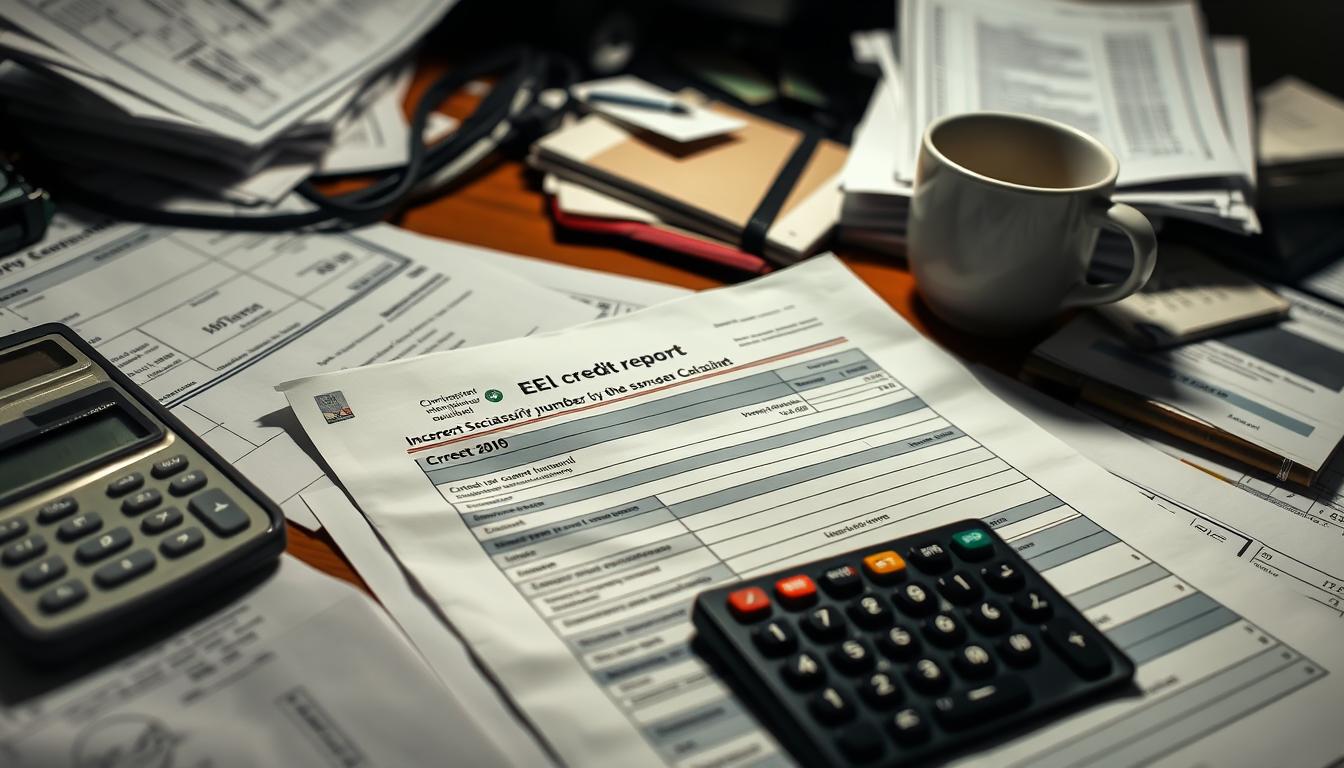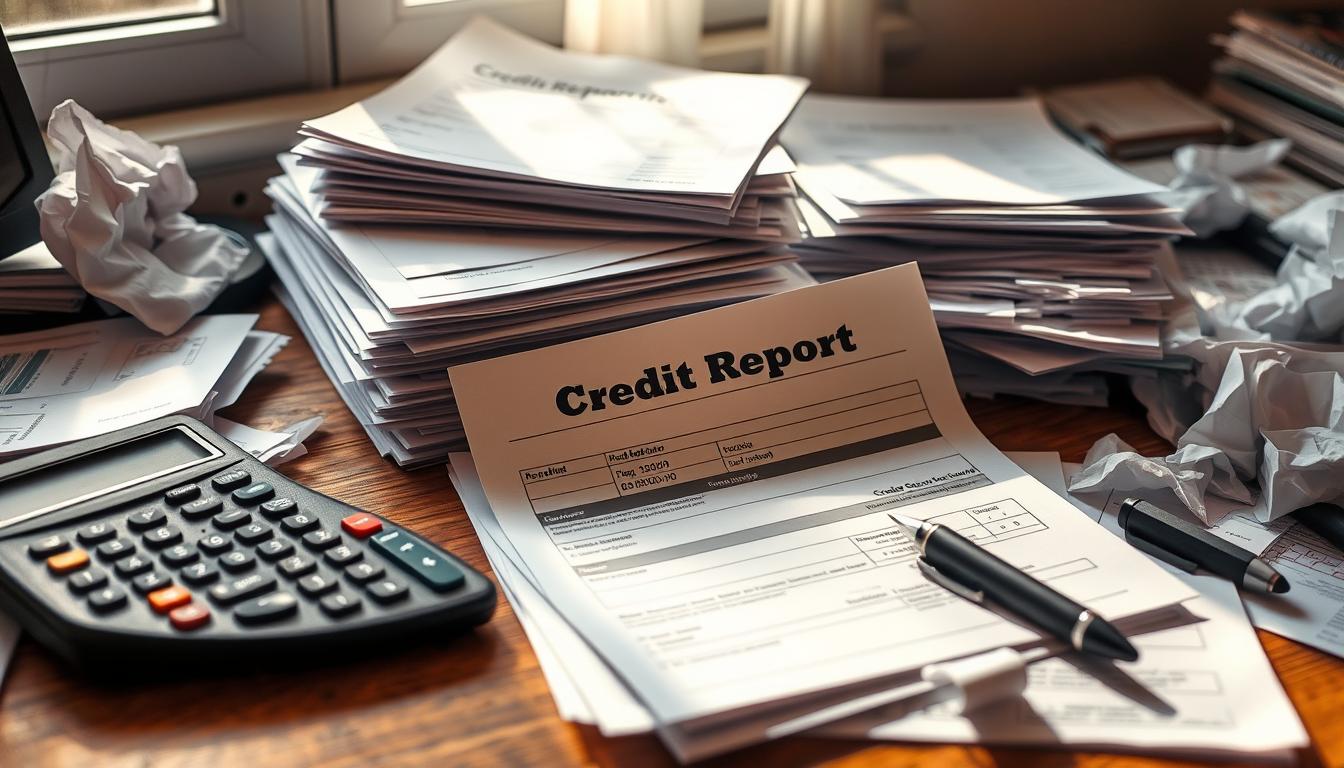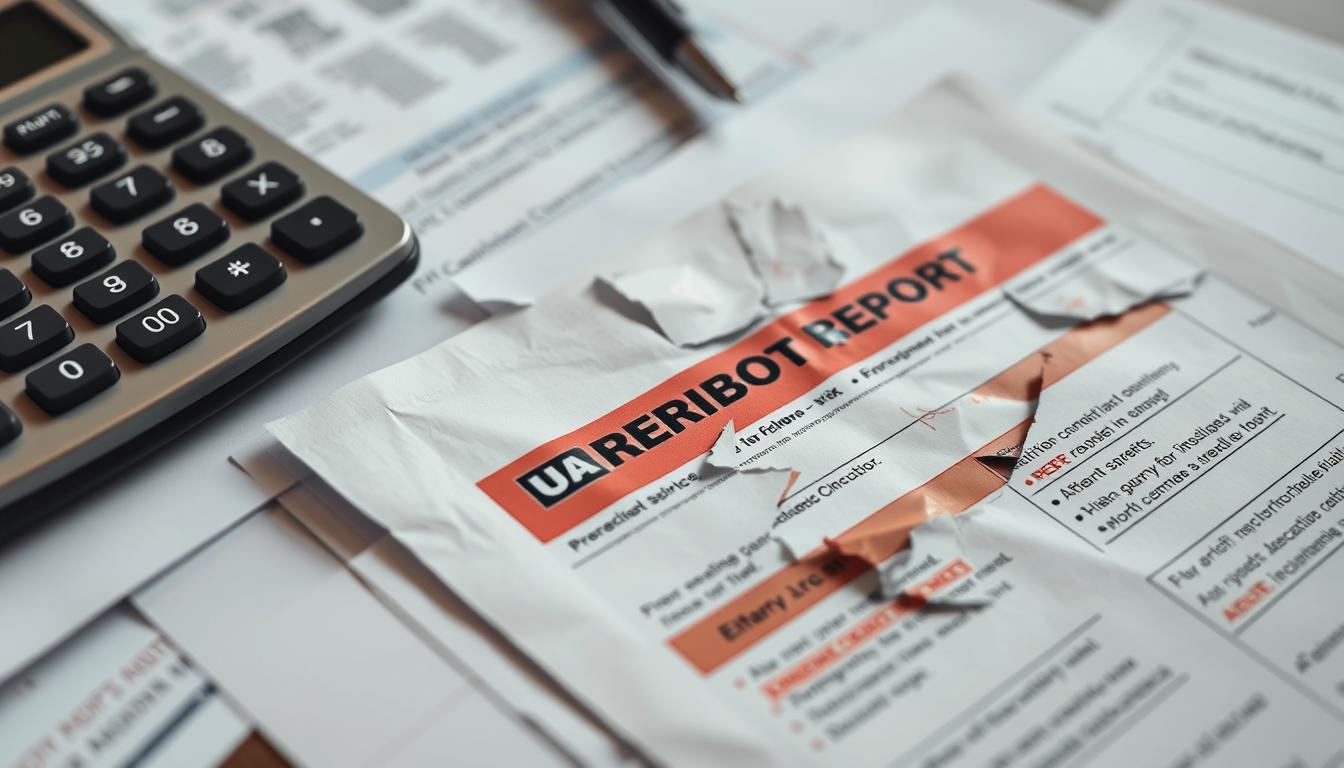An incorrect social security number on your credit report can lead to serious problems. It may hinder your access to credit and increase identity theft risks. This guide will help you address these issues effectively.
We’ll explore the consequences of this error and provide steps to identify it. You’ll learn how to dispute inaccuracies and prevent future credit report problems. With this knowledge, you can take control of your credit information.
Key Takeaways
- An incorrect social security number on your credit report can lead to serious financial and legal consequences.
- Identifying the signs of a wrong social security number, such as accounts you don’t recognize, is the first step in rectifying the issue.
- Disputing credit report errors with the three major credit bureaus – Experian, Equifax, and TransUnion – is crucial to correcting the information.
- Credit reporting agencies have a responsibility to investigate and resolve inaccuracies on your credit report.
- Regularly monitoring your credit report and implementing preventative measures can help you avoid future credit report errors.
Understanding Credit Report Errors
Credit report mistakes can hurt your credit score. They can make it hard to get loans or credit cards. Knowing common errors and their causes is important.
Types of Credit Report Inaccuracies
Credit report errors come in different forms. These include wrong personal info, like incorrect social security numbers or addresses.
They can also involve wrong account details. This means incorrect balances, payment histories, or credit limits. Mistaken credit history is another issue.
Sometimes accounts don’t belong to you. Or negative info stays on your report too long.
- Incorrect personal information, such as an inaccurate social security number or address
- Erroneous account details, like incorrectly reported balances, payment histories, or credit limits
- Mistaken credit history, including accounts that don’t belong to you or negative information that should have been removed
Common Causes of Incorrect Information
Credit report mistakes happen for many reasons. Identity theft is one cause. Thieves use your info to open accounts in your name.
Clerical errors are another problem. Creditors or agencies might input your info wrong. Mixed files can also cause issues.
Your credit info might get mixed up with someone else’s. This can happen if you have similar personal details.
- Identity theft, where a thief uses your personal information to open accounts in your name
- Clerical errors made by creditors or credit reporting agencies when inputting or updating your information
- Mixed files, where your credit information becomes intertwined with someone else’s due to similarities in personal details
Knowing these errors helps you spot problems on your credit report. It’s the first step to fixing any mistakes.
A single credit report error can have a ripple effect on your financial well-being, making it crucial to regularly review your credit reports for any discrepancies.
The Consequences of a Wrong Social Security Number on Your Credit Report
An incorrect social security number on your credit report can have serious consequences. It affects your creditworthiness and financial health. Addressing this issue quickly is crucial.
A wrong social on credit report can make getting loans or credit cards difficult. It may also affect your job prospects. Lenders use credit reports to assess creditworthiness.
Inaccurate information can lower your credit score. This makes it harder to get good interest rates. It also affects your ability to qualify for the best financial products.
Your personal and professional life may suffer from these errors. Employers often check credit reports during background checks. Inaccuracies could hurt your chances of getting hired.
“A wrong social security number on your credit report can have far-reaching consequences, from difficulty obtaining credit to potential issues with employment. It’s crucial to address this problem as soon as possible.”
Fixing a wrong social on credit report is vital to restore your financial standing. Understanding the consequences helps you take action. You can protect your credit and financial opportunities by addressing this issue.

Identifying the Problem: Signs of an Incorrect Social Security Number
Spotting an inaccurate social security number on your credit report is crucial. It’s the first step to fixing this frustrating issue. Look out for these warning signs that may indicate a problem.
Warning Signs to Look Out For
- Unfamiliar accounts or credit inquiries on your report that you don’t recognize.
- Discrepancies in your personal information, such as your name, address, or date of birth.
- Unusual credit score fluctuations or sudden drops that are unexplained.
- Receiving collection notices or bills for accounts you’ve never opened.
- Errors or inconsistencies in your credit history, such as duplicate accounts or incorrect balances.
Regular credit monitoring helps catch these errors early. Stay vigilant and review your credit report often. This way, you can spot any wrong social on credit report quickly.
Identify credit report errors involving an inaccurate social security number before they cause major damage. Effective credit monitoring can protect your financial health.
“Keeping a close eye on your credit report is the best way to catch any issues with your social security number or other personal information.”
Early detection of these problems can save you time and stress. If you notice any suspicious activity, take action right away. Your financial future depends on it.
wrong social on credit report
Credit reports can be tricky, especially when your social security number is wrong. This small error can greatly affect your finances. It’s important to fix it quickly.
Identity theft is a main cause of incorrect socials on credit reports. Criminals use your info to open accounts in your name. This can hurt your credit score and financial status.
Clerical errors are another common reason for wrong socials. Creditors or credit bureaus might mix up or mistype your number. This leads to incorrect info in your file.
A wrong social on your credit report can cause serious problems. It can make getting loans or jobs harder. Lenders and employers use this info to judge your creditworthiness.
It’s tough to separate your credit history from someone else’s. This can lead to more financial troubles. Fixing this error is key to protecting your financial health.
| Potential Consequences of a Wrong Social on Credit Report | Impacts |
|---|---|
| Difficulty Obtaining Credit | Lenders may be hesitant to extend credit or loans due to the inaccurate information on your credit report. |
| Employment Challenges | Employers may use credit reports to evaluate job applicants, and an incorrect social security number could raise red flags. |
| Financial Complications | Mixing up your credit history with another individual can lead to errors in your credit score and overall financial standing. |
Next, we’ll look at how to spot and fix these errors with credit bureaus. This will help ensure your credit report is accurate.

Disputing Credit Report Errors with the Credit Bureaus
Credit report errors can be frustrating. But there’s a clear process to dispute inaccuracies. Stay persistent when working with credit agencies to keep your information accurate.
Step-by-Step Guide to Disputing Inaccuracies
Found errors on your credit report? Here’s how to dispute them with credit bureaus:
- Obtain a copy of your credit report from each of the three major credit bureaus: Experian, Equifax, and TransUnion.
- Review your reports thoroughly and identify the specific errors or inaccuracies you want to dispute.
- Gather supporting documentation, such as payment records or other evidence that can demonstrate the information is incorrect.
- Contact the credit bureau(s) directly and initiate a dispute. You can do this by mail, online, or over the phone.
- Provide a detailed explanation of the errors and submit your supporting documentation.
- Follow up with the credit bureau(s) to ensure your dispute is being investigated and resolved in a timely manner.
- If the credit bureau does not resolve the issue to your satisfaction, you can escalate the dispute to the Federal Trade Commission or consider seeking legal assistance.
Persistence is crucial when disputing credit report errors. Follow this process to protect your financial well-being. Your efforts can ensure your credit information stays accurate.
The Role of Credit Reporting Agencies in Rectifying Mistakes
Experian, Equifax, and TransUnion are the three major credit reporting agencies. They must investigate and fix any errors consumers report. This legal duty helps maintain accurate credit records.
Found an error on your credit report? Start by filing a dispute with the relevant agency. They’ll investigate and share results within a set time.
- The credit reporting agency must review all relevant information and documentation provided by the consumer.
- They must also reach out to the data furnisher, such as a lender or creditor, to verify the accuracy of the disputed information.
- If the information is found to be inaccurate, the credit reporting agency must correct the error and update the consumer’s credit report accordingly.
These agencies protect the accuracy of consumer credit reports. Their work shields individuals from unfair credit impacts. It helps prevent decreased creditworthiness and higher borrowing costs.
| Credit Reporting Agency | Contact Information | Dispute Process |
|---|---|---|
| Experian | Phone: 1-888-397-3742 Online: www.experian.com/disputes | Consumers can initiate a dispute online, by mail, or by phone. |
| Equifax | Phone: 1-800-685-1111 Online: www.equifax.com/personal/credit-report-services/credit-dispute/ | Consumers can initiate a dispute online, by mail, or by phone. |
| TransUnion | Phone: 1-800-916-8800 Online: www.transunion.com/credit-disputes | Consumers can initiate a dispute online, by mail, or by phone. |
Knowing how agencies fix credit report errors empowers consumers. It helps them protect their financial information and maintain good credit standing.

Preventing Future Credit Report Inaccuracies
Accurate credit information is vital for your financial health. Taking proactive steps can help you avoid credit report errors. These measures can protect your credit profile and shield you from identity theft.
Proactive Measures to Maintain Accurate Credit Information
Monitor your credit reports regularly to catch errors early. Check reports from Experian, Equifax, and TransUnion yearly. This helps you spot and fix credit report errors quickly.
Consider signing up for a credit monitoring service. These alert you to changes or suspicious activity on your credit report. This allows you to act fast to protect your finances.
Keep your personal information up-to-date with creditors and employers. Update your address and phone number with the Social Security Administration too. This ensures your credit report has the most accurate details.
Guard against identity theft by using strong passwords. Be wary of phishing scams that try to steal your data. An identity theft protection service can help monitor your personal information.
Use these proactive credit management tactics to maintain a healthy credit profile. They’ll help reduce future credit report errors and boost your financial well-being.
The Impact of Credit Report Errors on Your Credit Score
Errors on your credit report can hugely affect your credit score. This score is vital for lenders to judge your creditworthiness. Inaccuracies can lead to serious problems for your finances.
Credit report errors can misrepresent your credit history. Inaccuracies like late payments, high debt levels, or even accounts that don’t belong to you can all drag down your credit score. This can make getting loans, credit cards, or rentals harder.
Unresolved issues can persist on your credit report. Unresolved issues can continue to haunt your credit report, leading to a vicious cycle of low scores and limited access to credit. It’s vital to fix any errors quickly.
Improving Your Credit Score After Addressing Errors
You can take steps to fix your credit after addressing errors. These include:
- Disputing any inaccuracies with the credit bureaus to have them removed from your report
- Monitoring your credit report regularly to catch and address any future errors
- Building up a positive credit history by making on-time payments and keeping your credit utilization low
These actions can help restore your credit score. You can regain control of your financial future. Maintaining accurate credit information is crucial for securing the best rates and terms on loans, credit cards, and other financial products.

“Protecting the accuracy of your credit report is essential for safeguarding your financial well-being.”
Credit Monitoring and Identity Theft Protection Services
Data breaches and identity theft are on the rise in our digital age. Credit monitoring and identity theft protection services help safeguard your financial well-being. These tools keep you informed about changes to your credit report and protect against identity theft.
Credit monitoring services provide regular updates on your credit report. They alert you to suspicious activity or changes that might indicate identity theft. This helps you quickly spot and fix any credit report errors or fraudulent accounts.
Identity theft protection services offer more comprehensive coverage. They monitor your personal information, credit file, and public records for suspicious activity. These services also help with identity restoration and credit repair if needed.
Investing in these services helps protect your financial health. They ensure your credit report accurately reflects your creditworthiness. This is especially useful if you’ve had credit report errors before or worry about identity theft.
| Feature | Credit Monitoring | Identity Theft Protection |
|---|---|---|
| Credit Report Monitoring | ✓ | ✓ |
| Identity Theft Detection | Limited | ✓ |
| Identity Restoration Assistance | Limited | ✓ |
| Credit Repair Services | Limited | ✓ |
These services are valuable for anyone worried about credit report errors or identity theft. They help maintain a healthy financial profile and boost your long-term financial security.
Legal Rights and Recourse for Credit Report Inaccuracies
Found errors on your credit report? You have legal rights to fix them. The Fair Credit Reporting Act (FCRA) lets you dispute wrong info. Credit agencies must investigate and correct mistakes on your report.
The FCRA holds credit bureaus responsible for keeping accurate records. If they don’t resolve your dispute, you can take legal action. This may force them to fix errors and pay you for damages.
The FCRA also gives you free yearly credit reports. You can get one from each major bureau: Experian, Equifax, and TransUnion. This helps you spot credit report errors and identity theft signs early.
Regular checks and quick action can boost your credit repair efforts. Use your rights to keep your credit info accurate and up-to-date.

